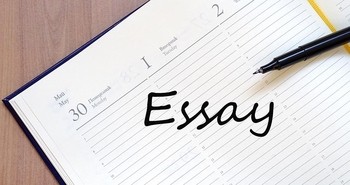
Music has become an everyday part of modern life – with the popularity of earbuds, streaming services, and unlimited data, we never have to be without music. Listening to music has advantages when it comes to studying and writing, but, as research shows, the kind of music we listen to has an influence over how effective our work is.
If you want to listen to music while you write, there are a few things you should keep in mind when selecting a song or building a playlist. While music gives us certain advantages during the writing process, there are certain ways in which music can be a distraction and hinder your writing rather than help.
1) Music with lyrics can distract you from what you’re writing
Have you ever been half-listening to a song while talking to a friend or writing something down then, without you ever realizing it, the lyrics of the song you’re listening to make it into your conversation or down on the page?
This can happen during the writing process too. When we hear people talking, or in this case, singing, those words are picked up by our subconscious even if we aren’t focusing or paying attention to them. This means that whatever you are writing might magically have a few lyrics pop up in them and, unless your writing assignment is about that specific song, you probably don’t want that in your writing assignment.
A simple trick is to just avoid music with lyrics. This can mean listening to some dance music, some classical music, or even look up some of your favorite songs without vocals (they exist on YouTube, at the very least) and put together a strong list that will keep you from accidentally including lyrics in your writing assignment.
2) Classical music can increase your focus on your work – especially the works of Mozart
There are multiple studies that show what’s called the “Mozart effect” – or the influence classical music has over our brains when we listen to it, especially Mozart’s works. Essentially, the original study in 1993 found that listening to classical music improved our brain’s performance over other types of music and that Mozart especially increased this effect.
While critics of the study say that the Mozart effect is a placebo or false association, subsequent studies show that these results are repeatable and that, from rats to humans, listening to classical vastly improves brain function with Mozart’s works still giving the best results.
What does this mean for you? Even if you aren’t a fan of classical music or of Mozart specifically, you should, especially on difficult writing assignments, put on Symphony No. 40 or Piano Sonata No. 11 and get to typing.
3) Music can energize you when you feel like your writing is dragging
We’ve all been there – after a long day of school, or, worse yet, work and school, you have to go home and start your writing assignment. Writing is a difficult enough task, and it gets even more difficult to get words down on the page when you’re tired.
Music, even classical music, and Mozart as discussed above can help find the energy to write your creative essays from scratch. Putting on something upbeat or fast-paced can trigger your brain into feeling more awake and can, thus, help you find the energy after a long day to get your work done.
The same researchers who brought us the Mozart effect have done further studies on how music influences the brain while studying or writing and have found that it’s not just Mozart that influences how our brains function, but the pace (or tempo) of music. Faster paced music and music sped up, helps us feel more energized and has a strong influence on our focus and our moods.
And if you feel like there are specific songs, say songs with lyrics, that help your brain wake up but might also distract you from writing, you can always listen to these songs first before you start writing to get your brain into an alert state.
4) Listening to the same songs when you write can help you trigger your brain to be ready for the writing process
While this article has linked to studies showing how music improves your performance, mood, and alertness when it comes to writing, that’s not the most amazing thing music can do when you’re writing: listening to music, or the same music while you’re doing a task, trains your brain to do that task while listening to that music.
This means that, even if you aren’t in the mood to write, if you have a song you listen to all the time when you are writing, it can trick your brain into wanting to write. This sounds like an insane life hack, but it actually works.
And, if you really want to train your brain to respond to music, you can vary the music you listen to according to your writing task: Have an English essay to write? Listen to Mozart’s Clarinet Concerto and every time you have an English assignment revising that song so your brain associates it with English essays. Have a biology lab report to write? Put on Mozart’s Piano Sonata No. 16 and write away, and repeat as needed for future lab reports.
With these tips, tricks, and proven techniques, you can maximize the effects that music has on the writing process. For even more information on how music can help your writing, or if you want to take a break from writing while listening to music, there are always writing services out there that can assist you with your work.

